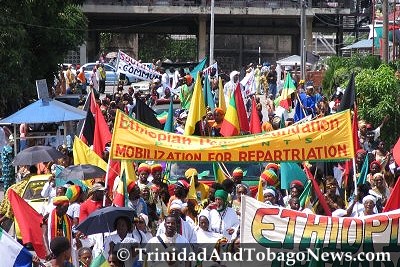By Dr. Kwame Nantambu
November 14, 2009
www.trinidadandtobagonews.com

History is one of the most powerful weapons in the armory of a people to define and empower and defend themselves.
If a people do not place themselves in their proper historical context, then, such a people would be defenseless, powerless and nothingless. As such, it is very vital for a people to write, interpret, and analyse their own history for, by and of themselves. Failure to do so would be fatal for their existence. And their demise would be assured. No people should allow another people to write, interpret and analyse their own history. Most of all, the oppressed or colonised must not allow their oppressor or coloniser to write, interpret and analyse their history. More specifically, we Afrikan people must not allow our European oppressor/coloniser to write, interpret and analyse our history.
Continue reading Role of History and Culture in The Liberation Struggle →






 In light of the devastating effect that AIDS is having on the continent of Africa, it is unconscionable that Pope Benedict XVI should condemn the use of condoms as a way to reduce the spread of HIV and AIDS. In a recent visit to the continent where 22 million people are living with the disease, Pope Benedict XVI stated that, “condoms are not the answer to the AIDS epidemic in Africa and can make the problem worse”. This begs the question, “How many more of Africa’s sons and daughters must suffer and die before this hood wearing demon places human life ahead of religious dogma?” Indeed, contraception is not the panacea that would put an end to this scourge, but it will do much to curb the alarming rate of infection.
In light of the devastating effect that AIDS is having on the continent of Africa, it is unconscionable that Pope Benedict XVI should condemn the use of condoms as a way to reduce the spread of HIV and AIDS. In a recent visit to the continent where 22 million people are living with the disease, Pope Benedict XVI stated that, “condoms are not the answer to the AIDS epidemic in Africa and can make the problem worse”. This begs the question, “How many more of Africa’s sons and daughters must suffer and die before this hood wearing demon places human life ahead of religious dogma?” Indeed, contraception is not the panacea that would put an end to this scourge, but it will do much to curb the alarming rate of infection.